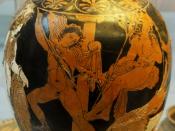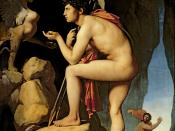The free will versus fate debate dates back to before 500BC. Some people believe that fate dominates a person's entire life, that all events are inevitable. Others feel that we are free to make choices in life and that nothing is certain. In the play Oedipus the King, the writer Sophecles demonstrates through the Gods and the oracles what little influence the characters in the play such as Oedipus, Creon and Jocasta have over their own lives as well as using the townspeople to show that they too have no choice due to the controls on society. Through the use of the fate versus free will idea that runs throughout the play, Sophecles suggests that man ultimately has a decided fate, with little or no power to choose.
Oedipus is a prime example of a person who has no choice in how to live his life, his fate decided at birth with an oracle that destined him to kill his father and marry his mother.
Although he did not discover this fortune until much later in his life, when he did learn of the oracle, he immediately "fled away" from the people whom he thought to be his parents and traveled to Thebes, fulfilling the first part of the oracle along the way without even realizing. After solving the Sphinx's riddle and becoming King, Oedipus then became married to his mother who happened to be Queen of Thebes. All along Oedipus believed he could choose, that his decisions would ensure "that no such horror would ever come to pass" but as he finds out in the end he was foolish to think he could escape the oracles because no matter how great he was, he was still a man and "mortal man must always look to his ending."
Another example of the powerlessness of individuals, especially ones who do not believe or accept the oracles is Oedipus' wife and mother, Jocasta. When her newborn son was given the fate of killing her husband and marrying her, she thought she could outwit the oracles by giving her son away to be killed. Thinking she had the oracles fooled, she decides that are not to be believed, that they are only a "fig for divination" and that it is in fact "chance that rules our lives". But as Oedipus' past becomes more clear, she begins to panic, realizing that the oracle has already come to fruition and kills herself so she does not have to face the fact that it was he foolishness that lead to the oracle unfolding.
Although Laius only features in the play in recollections, he is still an example of how little control people have over their own lives. Just like Jocasta he thought he had fate fooled after hearing the oracle and casting out his only son to die on a mountainside. However not even a King can escape the fate dealt to them and Laius' actions come back to haunt him whilst on a pilgrimage. He is attacked tumbles "headlong out of the carriage" he was traveling in and killed by his son Oedipus whom the audience know was spared by the shepherd put in charge of killing him. After all the trouble he went to, Laius proves that no amount of effort can change an oracle and that Sophecles wanted to show just how powerless man really is when it come to controlling his own life.
It is not only the oracles that Sophecles uses to demonstrate that people by and large have no control over their lives, he also uses the townspeople of Thebes to show that the controls on society can also render people powerless in regards to their lives. The people of Thebes were subject to the evil Sphinx that remained at their gate and killed everybody who couldn't solve her riddle until Oedipus came up with the answer and destroyed her power. Around fifteen years later a plague was set upon Thebes by the gods in punishment for "the shedding of blood", killing many citizens and almost bringing the town to extinction. These events were not the ordinary townspeople's fault and there was nothing they could do to fix the state of peril their town was in. They were powerless to choose, their lives were out of their control.
Throughout the play 'Oedipus the King" each and every character have the ability to make their own choices and believe in free will, but as Oedipus, Jocasta, Laius and the townspeople show, ultimately they have little control over what happens to them during their lives, as they will eventually fulfill what fate they have been dealt, no matter how hard they try to avoid it. It is these characters, especially Oedipus that Sophecles uses to suggest that perhaps people ultimately have little or no control over their lives and that just maybe we all have a pre-determined fate awaiting us.


